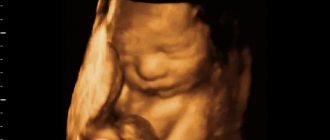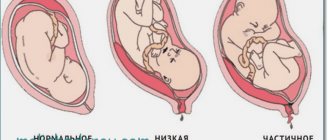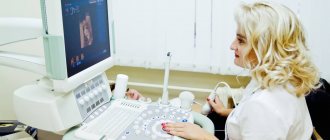Photo: UGC Carrying a child is a difficult psychological and physiological period in a woman’s life. Toxicosis, hormonal surges and declines, fatigue and drowsiness of the first trimester recede as soon as the 14th week of pregnancy begins. This is the beginning of the second trimester, which brings new sensations and challenges. Let us tell you in more detail what the expectant mother needs to know about this period.
What's happening
By the end of the 14th week of pregnancy, the fetus will reach about 12.5 cm in length and weigh between 35 and 45 g.
At this stage, not only the motor, but also the facial activity of the child increases: he yawns, grimaces, smiles. The baby's face becomes more perfect: the eyes come closer together, the ears take their place, the cheeks, nose, forehead, bridge of the nose and eyebrows emerge clearly. The body and head are covered with delicate fluff.
By 13–14 weeks of pregnancy, the pancreas and thyroid glands are already producing hormones, and the liver is producing bile. The kidneys and ureters secrete urine, which ends up in the amniotic fluid, but don’t worry: this is not harmful to the baby, because the amniotic fluid is constantly renewed. Also, at the 14th week of pregnancy, the fetal genital organs continue to improve: in boys, the prostate develops, and in girls, the ovaries descend from the abdominal cavity into the groin area.
The baby's muscles are becoming stronger. The bones are still soft and made of cartilage, but gradually they will begin to harden. During this period, training of the respiratory system continues: the fetus inhales the amniotic fluid and pushes it back out. The child feels the taste of amniotic fluid; Moreover, he has already developed his own taste preferences, and he clearly reacts to sweet, sour or bitter.
Although by the 14th week of pregnancy the composition of the blood has not yet formed, it is already possible to determine its group and Rh factor. And the baby’s heartbeat can be heard even with a regular stethoscope.
Mandatory tests at 14 weeks
Before your next visit to your gynecologist, you need to take a general blood and urine test, unless the doctor has prescribed an in-depth study. If, after screening, he has grounds for analysis of amniotic fluid, he should prepare for the examination. Puncture of the uterus to collect amniotic fluid is carried out according to strict indications, in agreement with the pregnant woman. In one case out of two hundred there is a risk of miscarriage.
The sample is taken under the control of an ultrasound scanner so as not to harm the fetus. This analysis is extremely informative; its results can confirm or refute fetal development pathologies with 100% accuracy.
How you feel
Toxicosis of the first trimester finally subsided by the 13th - 14th week of pregnancy. Your appetite gradually returned, and your sense of smell returned to normal. As your well-being improves, you begin to calmly perceive those tastes and smells that were unpleasant in the early stages.
Changes in the functioning of the cardiovascular system can still lead to changes in blood pressure. When it increases, nosebleeds or bleeding gums are possible. During this period, certain “metamorphoses” also occur with the skin: you may develop freckles, condylomas, and papillomas.
Some expectant mothers complain of constipation when the 14th week of pregnancy begins. A decrease in intestinal motility may be associated with hormonal changes and the pressure of an enlarging uterus on the internal organs. Simple exercise, dietary changes (you need to include more foods containing fiber in your diet) and drinking enough liquid will help solve the problem.
Preparing for an ultrasound examination: what to expect and how to prepare
Many pregnant women are afraid that this study may somehow harm the unborn baby, they are wary of the upcoming procedure, they are nervous, which actually harms both themselves and the child. There is no scientific evidence of the harmful effects of ultrasound, although specialists have carried out a lot of work in this direction. Prejudice is not a reason to refuse a truly important and necessary procedure.
This study does not require special preparatory measures. The only BUT: when pressing on the abdomen with a sensor, a feeling of discomfort may occur in the case of a full stomach or bladder. Therefore, before the procedure you should not eat heavy food or drink a lot of water. In some cases, particularly with a low position placenta, a full bladder may be required, so bring a bottle of water just in case.
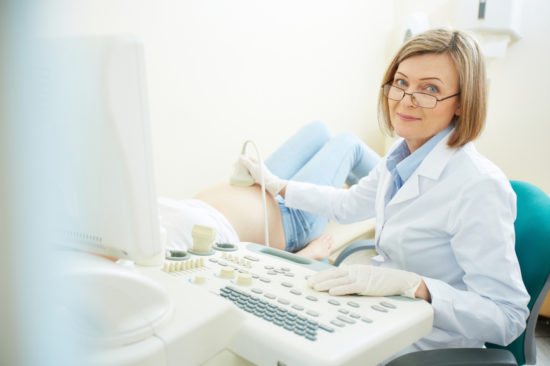
For the procedure you will need to take:
- A disposable gynecological diaper to cover the couch with. A regular towel will do.
- Shoe covers or replacement shoes.
- Sterile gloves and a special condom for ultrasound (if you are scheduled for an intravaginal examination).
- Wet wipes to remove residual gel from the abdomen.
This list is relevant for those who are undergoing the procedure in a antenatal clinic. If you resort to the services of private clinics, then you do not need to take anything with you, all this is already included in the cost of the services provided.
Risk factors
Although at the 14th week of pregnancy the main risks for the baby are over, high temperature at this stage can cause the development of serious complications. Colds are especially dangerous when the thermometer shows 38 degrees or higher. Therefore, at the first symptoms of the disease, you should definitely consult a doctor - it is necessary to treat a cold.
However, temperature can accompany not only a cold, but also various infectious diseases (toxoplasmosis, influenza, rotavirus infection), inflammation of the respiratory tract (pneumonia, bronchitis) and urinary tract (pyelonephritis and cystitis).
If a high temperature at a period of 13-14 weeks lasts for a long time, fetoplacental insufficiency may develop - a complex of disorders in which complications such as the threat of miscarriage, delayed fetal development, hypoxia, etc. arise. Therefore, self-medication is unacceptable.
If immediate contact with a specialist is impossible for some reason, try to bring down the temperature. To do this, you should do a rubdown, and in extreme cases, you should take a drug based on paracetamol. If after this the high temperature persists for several hours, hospitalization is required.
As in earlier stages, at the 14th week of pregnancy you should pay close attention to abdominal pain. Painful sensations can be caused by stretching of the ligaments that hold the uterus. In this case, minor dull pain is localized on the sides of the abdomen and sometimes radiates to the groin, but does not last long. If they appear suddenly, have a cramping nature and are concentrated in the lower abdomen, this may be a sign of uterine hypertonicity, which can lead to miscarriage. If such symptoms appear in the 14th week of pregnancy, lie down, rest and observe your condition. If the pain persists for 2–3 hours, and is accompanied by bleeding, call an ambulance immediately.
Nutrition
Gynecologists and other specialists advise sticking to proper nutrition throughout pregnancy. At the 14th week you should follow several rules:
- The daily calorie content of the menu should be about 2500 kilocalories.
- You should eat more meat or fish, vegetables, fruits and grains.
- You should avoid exotic foods to avoid possible allergic reactions.
- Reduce the amount of spices you consume.
- Avoid eating foods that contain chemicals such as dyes and preservatives.
- Strictly limit your consumption of sweets.
- You should be more careful with products that are on the list of allergens.
Medical observation
The 14th week of pregnancy is the time for a scheduled visit to the doctor and urine and blood tests. If necessary, the gynecologist prescribes an ultrasound. An ultrasound examination at this stage makes it possible to assess the development of the unborn child and determine how its internal organs (brain, heart, stomach, kidneys, intestines, bladder) work. It is still difficult to determine the sex of the baby. But with the help of equipment that works with the 3D format, this is possible.
The fetus is quite large in size, so it is possible not only to measure its “growth” from crown to tailbone, but also to establish the length of the femur and the ratio of the femurs: this is necessary in order to exclude the presence of developmental defects.
An ultrasound is also performed to detect chromosomal abnormalities at 14 weeks of pregnancy. But the expectant mother should keep in mind that if the indicators are negative, the results of an ultrasound examination cannot be considered a final diagnosis - additional tests and examinations are necessary to confirm it. For example, if Down syndrome is suspected, a chorion biopsy (villous membrane of the fertilized egg) is performed during the 13th – 14th week of pregnancy.
Effect of toxins on fetal development
Although all the main organs of the unborn child are already functioning, and there is no fear of mutations due to toxic effects, developmental disorders of the child are possible due to exposure to nicotine, alcohol, and drugs. The placenta is an excellent barrier to protect the baby, but it cannot protect against some toxins. Alcohol and nicotine, once in the blood, will immediately end up in the child’s circulatory system and penetrate the brain.
These toxic factors cause placental insufficiency, and the fetus immediately experiences a lack of oxygen and nutrients. Passive smoking and staying in a smoky room have the same properties.
Video about the condition of the fetus at 14 weeks, about toxins that affect a woman’s well-being:
Recommendations
- 14 weeks of pregnancy is a time when your uterus is growing rapidly, which means your tummy is getting bigger. Now you just need loose maternity clothes, and at the same time you can buy comfortable supportive underwear;
- Do simple physical exercises regularly - do gymnastics for pregnant women, swimming or yoga. Walk more in the fresh air;
- Sign up for courses for future parents, and it is advisable that your husband attends them with you. Then he will not be an outside observer, but will feel involved in the process of waiting for the baby;
- Diversify your diet. The 13th - 14th week of pregnancy is characterized by the absence of toxicosis, and you can treat yourself to something tasty. But don’t get carried away and constantly monitor your weight;
- Use public transport to a minimum and avoid contact with sick people;
- Take prenatal vitamins if necessary (but only after consulting your doctor);
- Report your position at work if you have not done so before;
- Try to bring positive emotions into your life: do what you like, meet friends. Remember that the 14th week of pregnancy, like all 9 months, is a wonderful time!
Vacation ideas
Lack of rest and proper sleep affects not only the well-being of the expectant mother, but also affects the growing body of the fetus. Even normal daytime fatigue is enough to cause changes in the fetal heart rate. How to cope with stress and normalize sleep? Here are some simple tips.
- A set of gentle physical exercises for pregnant women will help keep your figure in shape, and at the same time become a kind of release for accumulated tension in the muscles. If there are no health contraindications, then walking, water aerobics, and fitness for expectant mothers would be an excellent solution.
- Try to avoid stress and overwork. Fatigue accumulated during the day does not always lead to sound sleep. After a hard day, it is very difficult to relax while in a position. In the evening, you need to put off things that require intellectual and physical effort. And, of course, you should not watch action films, thrillers or horror films at night.
- When overstrained, relaxing water treatments are effective. For example, an enveloping warm bath with the addition of flavored sea salt and essential oils will be an excellent aid to sound and healthy sleep.
- Also, the expectant mother can ask someone close to her to give her a relaxing massage. This procedure will relieve back and lower back pain. Massaging your feet and ankles will help prevent cramps.
- To rest and relax a pregnant woman, it is recommended to focus on her breathing and take slow, deep breaths. Many people are helped by peaceful music or sounds of nature - the sound of the forest, surf, sea or rain.
- Before going to bed, it is advisable to drink a glass of warm milk (with cinnamon and honey) or herbal tea (chamomile, lemon balm, thyme, mint), which have a relaxing and sedative effect.
